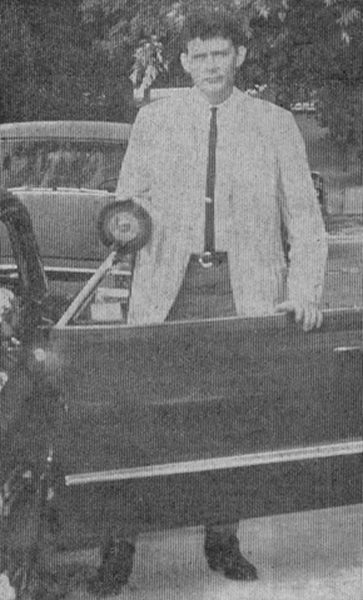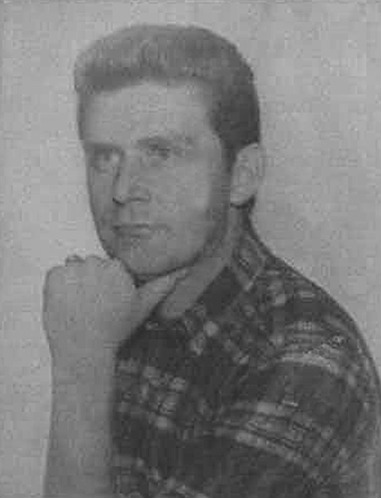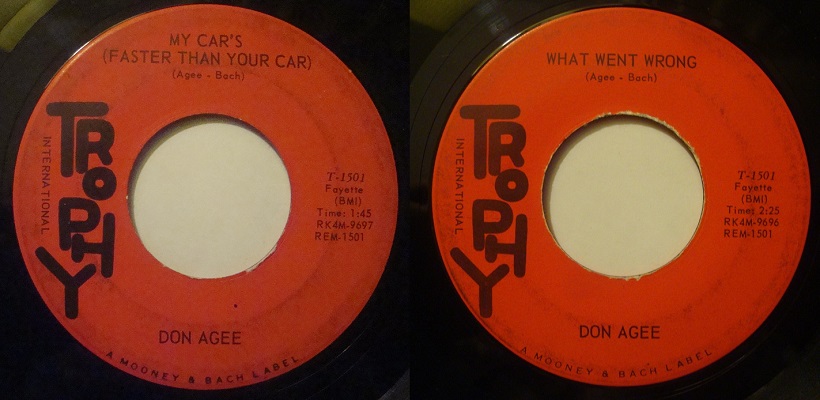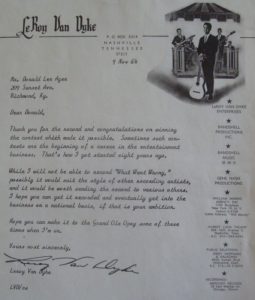It is easy to see how Donald Agee could have had a career on stage in one form or another. When I met Don back in 2000 he was already in his mid 60s, but looked many years younger. With a strong profile and stronger handshake Agee reminded me of a classic Hollywood tough-but-good guy. His manner was positive, humble and he had a great penchant for telling stories – and always with an authenticity that speaks to his rural upbringing. Don told me about all the songs he keeps in his head – I hope he finally wrote some of them down. Below is the original, unpublished Lexingtunes write-up for Don written in 2001.
I was so hoarse I couldn’t talk. Everybody was give out. It was like 4 o’clock in the morning and they were like…aw, let’s do it again!!
DON AGEE & THE DIGITS
Donald Lee Agee (vocal, guitar)
b Oct 17, 1936 near Kirksville, KY
d Oct 8, 2022
Michael G. Howard (guitar)
b Mar 9, 1949
Finley Ray Hamilton (drums)
b Jan 21, 1948 Richmond, KY
d April 14, 2009 Ellicott City, MD
Mountjoy Joseph “Monty Joe” Lovell (backup vocal)
b Nov 15, 1945
Harold D. Rhodus (backup vocal)
b July 11, 1945
Michael S. Terrill (backup vocal)
b Jan 25, 1947
Earl Dean Jones (backup vocal)
b Sept 12, 1944

Though less prolific than many of his Richmond musical peers, Don Agee, in the early 1960s, was the embodiment of hot-rod rock ‘n roll. Agee’s lone recording succinctly captured every teenage boy’s dream—a pretty girl, hepcat clothes, and a roaring engine.
Donald Agee acquired his first guitar at the age of nine as a present from his mother. The young Agee learned chords from wherever he could and quickly began to entertain—first at home and later at church. Music and drag racing occupied most of his teenage years. When not playing local dances or radio shows, Agee could often be found at local drag strips where he won many trophies. In his early twenties, he polished his style at various hootenannies around the Richmond area. It was at such events that he began making solid contacts with other musicians and promoters.
One such person was WEKY disc jockey Baldwin “Ichabod” Powell. Ichabod sponsored a battle-of-the-band contest with the winner to receive a record deal from Bob Mooney’s Trophy International label in Lexington. Don Agee and the Digits proved to be the eventual winners having eliminated such competition as a pre-Exiles group called the Fascinations and Leroy Pullins (who would later record the novelty hit “I’m A Nut” for Kapp records).
Don Agee and the Digits arrived in Lexington in the summer of 1964 to record the song “My Car’s (Faster Than Your Car)”. The uptempo rockabilly number was penned by Agee as an homage to his previous car and drag strip champion—a 1955 Chevy. To enhance the sound, Bob Mooney hired Lexington guitarist Bill Wasson to play lead and local preacher Dennis Lewis was added on the upright bass. Background vocals were provided on both sides by Monty Joe Lovell, Mike Terrill, Dean Jones and Harry Rhodus. Rounding out the session were Mike Howard on guitar and Finley Hamilton on drums. The flip-side ballad “What Went Wrong” again featured lyrics by Agee with music composed by Trophy International co-founder Kelly Bach.

Throughout the mid 60s, Don Agee continued to play the Richmond/Berea area with occasional appearances at the Berea Homecoming and Renfro Valley. He tried during this period to make the transition from singer to songwriter and submitted demos to artists such as Leroy Van Dyke. A wife and child prompted Agee to seek steadier employment—first as a factory worker and later as Postmaster of Beattyville.
Of the remaining Digits, only Mike Howard and Finley Hamilton pursued music further. Howard was a member of an early incarnation of the Exiles and played with other Richmond bands. Hamilton enlisted and became the conductor of the Army Forces Command Band in the 1980s.
Agee’s record was re-discovered by European collectors in the 1980s and has subsequently appeared on several American and European compilations. “My Car’s (Faster Than Your Car)” can still be found on rockabilly radio playlists throughout the country. – Shawn Chambers 2001
UPDATE: Don passed away in Oct 2022
PLEASE NOTE: Yes, I am aware of Don’s legal issues so no need to contact me. I choose to celebrate the man and his music and leave the sensationalism for others.
March 30 2017 – changed Digets to Digits per band member – Richmond Register had spelled it with an “e”. Name seems to have been derived for bands habit of wearing football jerseys during practice and/or gigs.
Discography:
45
TROPHY INTERNATIONAL
1501 My Car’s (Faster Than Your Car) / What Went Wrong 1964

Interview Disclaimer: The interview may have been lightly edited (some questions / answers re-arranged chronologically and/or combined for readability). The intent was not to publish and I have tried to always transcribe verbatim – so any grammatical errors are left in place. Any factual errors are my mis-understanding of a low quality mini-cassette, faulty memory or a combination of the two!
Interview with Don Agee – August 27, 2000
SC: Shawn Chambers
DA: Don Agee
SC: When and where were you born and what is your full name?
DA: I was born right out side of Kirksville—here in Madison County. My birthday is October 17, 1936, and my full name is Donald Lee Agee.
SC: When and how did you get your first guitar?
DA: My mother bought me a guitar. She always wanted me to be a star. And, of course, I could sing all my life. When I was five years old I sung in church, and I’d get down there and swing and sing and I’d beat on this old guitar with no strings on it. So mama bought me a guitar and I got to learning how to chord this thing and, finally, they all run me out of the house. I went down and sit in the barn loft and my fingers got so sore, I taped them up. I was determined, you know. I kept on and then, you know, people come by and heard me sing and they’d say ‘Dang you outta do something with that.’ And it would tickle you for people to think that you had some talent.
SC: Did you play much around the area growing up?
DA: Well, some, but real informal. Back in them days there was things called Hootenannys. Well, I tell you what happened…I’ll tell you kind of an interesting story. I drove out here one day in Spivey—we lived in town at the time—and there was a group of guys sitting up at the old country store just picking and singing. So I got out, sang a song or two, and they said hey man, you know, ‘We like your singing. Come back tomorrow night. We’ll have more musicians.’ So I go back the next night and…that’s before I got married…I was singing then. And uh…they had more musicians and we was singing and the old farmers had all gathered in a-listening. So, after a while, the old fella who run the store said ‘You all want to have a Saturday Night Hootenanny.’ So all of us guys who gathered up there at the store, he donated a vacant lot. And man, before this thing was over…this new Irving road wasn’t open yet—it was just the old road that come right through Bybee over there by the pottery [Bybee pottery factory -sc]…man, they was cars parked five miles each way. I bet they was five hundred people there, you know, to hear us all sing. And, man, we played over there and people come and other bands started coming in. And then they had a huge brawl over there one night—a big fight—and all busted up, you know. We didn’t have it no more. But people would come to our house and say ‘Hey Donald would you come…’ , you know, if they would open up a barn somewhere. You know, everybody got to wanting to kind of capitalize on it. You know, they wanted to make a little money. But, anytime they’d have anything around here I was always invited.
SC: How was it that you hooked up with Bob Mooney’s Trophy label for your record?
DA: Well, Ichabod Powell, he was a disc jockey over at WEKY. He worked part-time over at, well he worked over at Westinghouse where Jimmy Stokely and myself worked back in the 60s. So Ichabod got in touch with Bob Mooney some way and, of course, Ichabod was trying to make him a little change. And he got together a contest here in Richmond. And he made a deal with Mooney that whoever won the contest could make this record. So they had eliminations. You played one weekend and if you won you went on to another weekend. So a lot of groups came in. One of the guys that came in and played was Leroy Pullins from up at Berea. He started him a little studio up there, but Leroy, of course, he got eliminated. And he went on to record for some company down in Nashville or someplace. He recorded a song called Andersonville—about the southern prison and he had another kind of like a Roger Miller thing called “I’m A Nut”. But anyway, the Fascinations was in that elimination thing and they got down to the final night with myself and my little band. Of course, they consisted of Jimmy Stokely and Paul Smith and several local guys. Later the Fascinations disbanded and reformed as the Exiles. I don’t think Paul went with the Exiles much, but Paul went on to California. And his mother, right now, is living up the road and she’s got gold records hanging all over the walls where he promoted people. He had some big names. He died of a heart attack. Stokely and them went on and had the number one hit song [Kiss You All Over – sc]. And later he passed away. But anyway, of course, we won the thing and made the record. Never did do a lot. My wife and I did most of the distributing. Get in the car, take off, give it to a radio station, drive on down the road and listen to ‘em play it. We had a ball!
SC: I guess this contest was a friendly rivalry with all you guys playing together in town quite a bit?
DA: Oh yeah. Jimmy Stokely and I were real good friends. We later worked together at Westinghouse and we had a ball. I got postcards he sent me from New York when they went out on tour. But several of these same bands would play the Homecoming each year. Red Foley and Pat Boone and all of those artist would come in. Now Leroy told me a funny story—Leroy Pullins. See he met Pat Boone. Pat came up and stayed… Pat married Red Foley’s daughter. He came up and stayed with Cotton. That’s Red’s brother. Leroy met him and Pat told Leroy ‘Come out to California and I’ll help you out.’ So Leroy’s like myself—just an old poor country boy. So he get’s him a bus ticket and goes to California. He says Pat didn’t hardly act like he knew him after he got out there. (Laughs) He says ‘Man, I like to not ever made it back to Kentucky. I had to eat bologna sandwiches until I hate bologna sandwiches. Hitchhiked and everything else trying to get back!’ (Laughs) That’s Leroy.
SC: Do you know why your record came out on Trophy International label rather than Bob Mooney’s better established REM label?
DA: No, I really don’t know. It seems like he had better connections with REM. But I don’t know.
SC: What was the recording session like?
DA: The night we recorded that little record over there on Liberty Road—it comes the awfulest storm you ever seen. That little studio of Mooney’s back there got to leaking water. We got to playing electric guitar and got scared thinking we were gonna get electrocuted! (Laughs) I had one buddy who had went along for the ride and he was at the door with a bucket and scoopin’ water and throwin’ it out of the house. (Laughs) We had a ball making that thing. I tell you, I bet we went over that thing 29 times. I was so hoarse I couldn’t talk. Everybody was give out. It was like 4 o’clock in the morning and they were like…aw, let’s do it again!! But Kelly Bach (Co-owner of Trophy International label) he was a good guy. What he did, he wrote music to my lyrics.
SC: Who was playing on the record? Is this correct in the newspaper article?
DA: Yeah, and like I say. You know if you mention me in a book I’d wish you’d mention those guys.
A lot of ‘em…you know they never did get much publicity, but a lot of those guys have gone on to be really important people. Finley Hamilton directs the Army band, I think, he came up to Eastern and put on a concert. Monty Joe Lovell—he’s big in education. Mike Howard carries mail at the post office. Mike still plays music. I don’t know what happened to Mike Terrill and the Rhodus boy. Dean Jones, I don’t know what happened to him.
SC: So these were the Digits…who did what?
DA: Well, Monty Joe Lovell he was one of the backup singers. So was Mike Terrill, Dean Jones and Harry Rhodus. They put a right good little sound…especially, you know, the flip side. And that was my favorite anyway. You know I just…I never did really like “My Car’s Faster Than Your Car” that well. But Mooney wanted something, you know, with a beat to it.
SC: So were you playing lead guitar?
DA: No. A fella named Bill Wasson from Lexington. We hired him. He was picking the lead guitar. He was connected there in some way with Mooney. Mooney knew him. And, you know, Mike was a good guitar picker, but we wanted, you know, really somebody to really put a good rock-n-roll sound. And Mooney says well that he’d just have Bill Wasson come over. Finley Hamilton plays the drums and Mike Howard—guitar–plus the backup singers. We had a bass player and I can’t remember his name, but I tell you what he was a pastor over here at Pine Knob Baptist Church. I can’t think of that man’s name. We went over there and got him ‘cause he was one of the best upright bass players in the country…and he agreed to go with us. And the church liked to fired him!! (Laughs) We tied his old big bass fiddle on top of our car and he went over there with us and made that rock-n-roll record and him a Baptist minister!
SC: Man, that is great! So how many copies of the record were pressed?
DA: Well, for winning the contest, they give me these masters and 500 copies. We sold ‘em for $1.00 a piece. Just like that. I kept maybe 8 or 10 copies.
SC: Did you get much regional exposure after the record came out?
DA: A little bit. Of course, WEKY and some other radio stations played it. I remember appearing on some kinda music show in Lexington where I pantomimed the song on TV. But that’s about it. I can’t remember the name of the TV show. I don’t know, I was always kindly a little bit embarrassed. Me and her went to the drive-in one night and I went down to the concession stand and they had a group that was entertaining during the intermission and they had it wired into the car speakers. Well, they said come up here and sing us a song. Jeanette couldn’t believe it when she heard me coming over the movie speaker! (Laughs) I did some singing at Renfro Valley. Maybe a trip or two down to Nashville, but they didn’t amount to anything.
SC: Now this newspaper article says you based the song (My Car’s Faster Than Your Car) on your ‘63 Chevy Impala, is that true?
DA: I really based it on a car I had before that one. I had a ’55 Chevrolet all souped up that just couldn’t hardly be beat. You know, the word around town. You can still talk to some of the guys that are still livin’ and they’ll tell you. You just couldn’t hardly beat that ’55 Chevy. But then I bought the ’63 409 which was really a fast car, but nothing like my ’55. But we courted in it. And a guy told me an interesting story about it the other day. He said he went to a car show over at Berea. He said ‘Donald I saw a ’63 409 sittin’ over there and it was beautiful. And I made a comment to my buddy. I said a friend of mine used to have a car like that. And my buddy asked who was it and I told him Donald Agee and we was fixing to walk off and the fellow who owned the car said ‘Hey, wait a minute. Who’d you say?’ and I said ‘Don Agee.’ And he said ‘Don Agee. Well, this was his car!’ (Laughs) I’d give anything to see it ‘cause I’d like to get a picture of it.
SC: You’d better watch it or you’ll be wanting to buy it back!
DA: (Laughs) Well, I couldn’t afford it now!!

SC: And this was your only record, right?
DA: Yeah. Well, I showed you some of these letters from Leroy Van Dyke where I had tried to send him some songs. Somewhere in the house, I think I still have a letter from Sam Phillips. But, you know, I wanted to go down there. Because I came up in that era—Carl Perkins, Elvis, Jerry Lee Lewis. You know I’m in that age group. I had some good songs. But really all the time in my mind, I never did think that I was good enough to be a nationwide singer. I always wanted to be a songwriter. That was my goal and intention. Because I told Jeanette that, you know, a songwriter makes as much as a singer and you don’t have all that publicity. A lot of people glory on publicity. But I don’t. I just like the quiet life. Plus if I had ended up a professional musician—I’d probably be dead. The road would’ve killed me!! (Laughs)
SC: At want point did you say to yourself that singing wasn’t something you would be doing after all?
DA: Well, course now, I don’t want Jeanette’s feelings to be hurt because it…well, my mother always said it was when I got married that ruined me! (Laughs) You know, when we got married, we began to want a home and, you know, to go out to really get into it—to start touring and all that—you know, it really runs a good chance of busting up your home or marriage or whatever. And we cared for each other and wanted to have a home, so I went to work. I started working for the postal service. Put in 24 years. We both worked hard and raised three little girls. You don’t make no money at this stuff unless you hit it big. A lot of guys I know, worried themselves to death trying to become a star. And like I say, most of them is dead now.
SC: Do you miss singing and performing?
DA: I have a lot of people that right now say ‘Donald, you ever sing anymore?’. Of course, I’ll sing some in church. Every once in a while, I’ll get my guitar out and pick a little. I play some with my son-in-law. I’ll play you a tape. We messed around here one day and I had him help with some music for some songs I had written lyrics for. These are old songs from the same time “My Car’s Faster Than Your Car” came out. The one is called “Dragstrip Baby” and I always wanted to record it, but never had the chance. (Plays tape). But I’m really happy with the way things turned out. I love my wife and my family and couldn’t ask for anything more.
Thank you for writing this article. This is my Uncle and he is a very amazing man. It is so good to see some of his stories and life in writing.
This is my grandfather, my dad is his only son. He was one of a kind, a true story teller, outdoorsman, and avid coon hunter. He will be missed